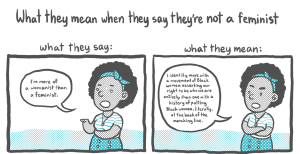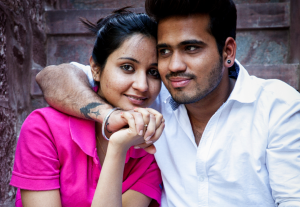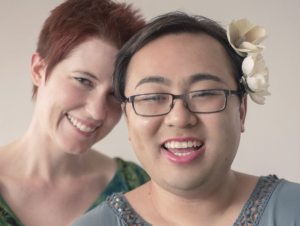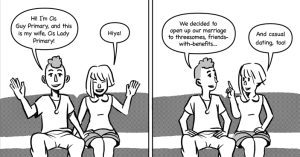
Two people – one in focus, one out – gazing into the camera as they lean against a red brick wall.
I love my Latinidad and I love my Blackness — I wish other people did, too.
The truth is, I was once confused on who I was and if I could even rightfully claim to be Latinx and, other times, Black.
I navigate the world as a light-skinned Black person who sometimes speaks with a Spanish accent (when I am nervous), and it’s a hard experience to navigate.
There are times that I need to be with Black people only, and that’s fair. When Trayvon Martin was murdered, I cried in the shower for weeks, and it wasn’t until I publicly talked about it during breakfast with four other Black folks that I was able to feel as if I would make it through life. I needed the love and validation that can only be received from Black person to Black person.
When my grandmother’s home in Oaxaca flooded, and neither my mother nor I could go to Mexico because we didn’t have “legal” documentation, I needed my Oaxacan community here in the states. We all shared this unique and stressful experience, so it made sense that we went to each other.
And, in both of those instances in my life, I was both Black and Latinx. Each experience that I go through can never separate how I navigate the world, and that’s something that both non-Black Latinx and non-Latinx Black folk need to know.
Being both identities does not mean that I only live my life as Black 50% and as Latinx 50%. Instead, it means that I live my life as Black 100% of the time, and my life as Latinx the other 100%. The math doesn’t need to make sense!
And in light of living my life at 200%, I invite both my Black community and my Latinx community to reflect on the ways in which you interact with Afro-Latinxs, because sometimes, having questions is okay, but at times, those questions and comments manifest in hurtful and damaging ways.
Below is a list of invasive comments, phrases, and questions that I, and many in my community, have received – and they must stop in order for us to be able to work together, and really be a community.
1. ‘Which One of Your Parents Is the Black One?’
When an Afro-Latinx person is asked which one of their parents is Black, they are literally denied their existence as Afro-Latinx, because both of the person’s parents can be Black.
Afro-Latinidad is not the result of an African American individual having a child with a Latinx individual. Afro-Latinidad can absolutely be the result of two Afro-Latinxs reproducing and having an Afro-Latinx child.
In addition, there are Afro-Latinxs who are not socially categorized as Black because they are light-skinned and may have stronger Latinx features (like my younger sister), but that doesn’t mean that they’re not Afro-descendants and that their experience and identity as Afro-Latinx is somehow less or fake.
Race is complicated and we can’t be the ones who decide who has a right to Blackness and who does not.
In addition, asking someone who in their family is “the Black one” is literally a form of policing because sometimes, the only physically Black person in someone’s family may be a grandparent or someone they may have never had the chance to know, which leads people to say, “well, you’re not really Black, because neither of your parents ‘look’ Black.”
2. ‘You Never Told Me You Were Black – You Speak Spanish!’
Being Afro-Latinx myself, I haven’t experienced this remark too much, primarily because I grew up on the East coast and Afro-Latinidad is a common racial and ethnic identity there due to its geographical proximity to the Caribbean. However, upon moving to the West coast, I found many people confused about why I had a Latinx last name and spoke Spanish (since I am visibly Black).
Upon living in the West for a couple of years, I have seen many in the Los Angeles Afro-Latinx community become more vocal about their experience as both Black and Latinx. Because Afro-Latinxs are being vocal about anti-Black interactions amongst non-Black Latinxs and other people of color, many non-Black Latinxs are censoring Afro-Latinxs, and using the excuse “I didn’t know you were Black,” to dismiss anti-Black comments and actions.
First of all, not “knowing” that someone is Black doesn’t give a person the green light to engage in anti-Black comments and actions.
Second, Afro-Latinidad is an identity that many of us grow into because many of us have to work through our taught internalized-Blackness, where our own Latinx community encourages us to use lightening-skin creams, straightening our hair, and rejecting our very evident Blackness. Because of internalized Blackness, many in the Afro-Latinx community are recently transitioning in taking pride in their African ancestry, and that’s why we claim our Black identity “late.”
This is particularly true to Afro-Latinxs who may grow up with just one parent, and their African ancestry has been passed down from their absent parent (yet another reason why people must stop asking “which parent is the Black one”).
3. ‘But You Don’t Speak Spanish…’
Latinidad and Spanish-speaking are not mutually exclusive terms.
Hispanic and Spanish are mutually exclusive, since both terms trace to the country of Spain, where people born in Spain, are Spanish people of Hispanic descent, and will most likely grow up speaking Spanish.
Latinidad has no official language. Spanish is a Latin language from Europe — some Latinxs speak Spanish because of Spain’s colonization.
Other Latinxs speak Creole, Dutch, Portuguese, Mam, Yucatec Mayan, Garifuna, etc.
Assuming that a Latinx has to speak Spanish in order to be Latinx is practically saying that Indigenous Latin American people can’t be Latinxs either, which is participating in settler-colonialism, where we still center Europe (Spain and the Spanish language) on our understanding of Latinidad.
4. ‘Are You Really Latinx?’
*screams inside*
This question is probably one of the most hurtful, as the question is rooted in deep anti-Blackness and colorism.
Many dark-skinned Afro-Latinxs in my close group of friends have shared with me that they are tired of participating in Latinx spaces, particularly because they are always forced to give a genealogy of who is and who is not Latinx in their family.
Why does this happen? Because many Latinxs are light-skinned and when they see a dark-skinned Black Latinx, their proximity to White Supremacy is challenged.
White-passing and White Latinxs are the most highlighted in the media, history, and society at large, so when a dark and Black individual rightfully claims their Latinidad, the internalized White Supremacy in our community arises.
Dark-skinned Black people get their humanity questioned over and over again, while light-skinned Latinx people only get their Latinidad questioned. This, unfortunately, is one of the largest problems in our community, and we must address it now.
5. ‘I Didn’t Know [Insert Country] Had Black People!’
It feels crucial for me to name this comment because it’s the one comment that never allows me to forget how neglected the African slave trade has been from the minds of all non-Black people. Slavery wasn’t a systematic project that only involved Africans being violently taken from their land and sent to the United States to be enslaved.
Slavery was a system that kidnapped, enslaved, and transported said enslaved Black people to locations all over the world including the European continent, North America, Central America, South America, and the Caribbean.
When people tell me that they’re shocked that I was born in Mexico because I’m Black and they just assumed I was either mulatto or African American, what I hear is, “Oh, Mexico had slaves too? How interesting.”
It’s really not a pleasant conversation to have, and I feel like I shouldn’t have to have it with anyone, because me having to explain that I’m Afro-Latinx because of the systematic slavery of Africans, is me having to engage in a painful conversation that reminds me that I might never know my roots or where in the diaspora my ancestors come from.
Sometimes, it’s best to keep comments to oneself, because at the end of the day, someone’s intentions won’t matter if the person they were speaking to ends up feeling frustrated, and erased.
6. ‘I Felt Connected to You Even Though You’re Black’
No, this didn’t only happen once, but about five times over the course of two years.
The last time this interaction occurred, the phrase at hand was something the lines of “I felt really comfortable with you talking about Latinidad because you understood and you’re Black.”
I have noticed that my Blackness is something that makes non-Black Latinxs see me as if I am incapable of understanding a Latinx experience, but the reality is, that I understand both experiences really well.
The issue that this phrase brings is that it already predicates that there’s something untrustworthy about my existence, and that thing is my Blackness.
This is true, because when a person is surprised that they were “comfortable,” or that they “connected,” with a Black person is literally saying that they do not see Black individuals as humans with the capacity of connection or trust. Whether we’d like to admit it or not, this is the same mentality that has had many of my Black kin killed by the police — supposed fear of Black violence, or distrust.
7. ‘Don’t You Think You’re Being Divisive?’
This is the last major phrase that I have heard from my Latinx community over and over again, but have heard about three times from my Black community as well.
Being both Black and Latinx doesn’t mean that I am trying to divide my two communities. If at all, it means that I am trying to bring them together.
I usually hear this phrase when I try to give feedback on direct actions that we are planning either around immigration, or for BLM events, and I start my statements with, “as an Afro-Latinx individual, I feel…” which gets me interrupted right away. Sometimes, folk feel as if I am privileging one identity over the other.
But I can’t afford to privilege one of my identities over the other because both affect me in radically different ways, every day of my life.
Yes, my Afro-Latinidad challenges dominant narratives of what a Latinx looks like and what a Black individual looks like, but the reality is that I’m not just going to stop being Afro-Latinx. Instead of being silenced, Afro-Latinx voices need to be heard because they bring an intersectional insight that enriches the way in which both the Black community and the Latinx community can organize more efficiently, and not stop until we are set free.
***
Sometimes, we say things without meaning harm, and that’s a mistake we all have made, and we can never have full control of it. However, it’s super important to reflect on our everyday interactions.
When we reflect, we’re able to pick out things we have said or done that we could have possibly done better, and times when we did, and we want to continue.
Reflection, though, doesn’t mean that it’s okay to police the identities of other people, because policing is something that already exists, and is used primarily to oppress Black, Indigenous, and of color communities, so let’s not go there.
Instead, reflection can be a tool to help us communicate with each other more intentionally, more compassionately, and hopefully with more authentic curiosity about each other’s existences and experiences.
The more curious we are about each other, the more likely we are to educate ourselves autonomously — instead of asking invasive and oppressive questions like the ones listed in this article… especially when we usually (and hopefully) have good intentions towards each other.
[do_widget id=’text-101′]
Alan Pelaez Lopez is a Contributing Writer for Everyday Feminism and an Afro-Indigenous migrant that grew up in Boston via La Ciudad de México, documenting their existence as an (un)docuqueer poet, jewelry designer, and a huge Frida Kahlo fan. Alan is currently in graduate school pursuing a degree in Comparative Ethnic Studies in the Bay Area, and a member of Familia: Trans, Queer Liberation Movement.
Search our 3000+ articles!
Read our articles about:
Our online racial justice training
Used by hundreds of universities, non-profits, and businesses.
Click to learn more
Most Read Articles
- « Previous
- 1
- …
- 30
- 31
- 32



















